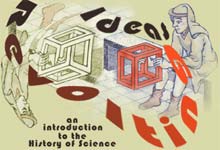
University of California, Irvine
Instructor: Dr. Barbara J. Becker

|
Week 6. Universal Reason The Regulæ -- Rules for the Direction of
the Mind
Written in Latin around 1628.
|
| 1. The aim of our studies should be to direct the mind with a view to forming true & sound judgments about whatever comes before it. |
2. We should attend only to those objects
of which our minds seem capable of having certain & indubitable cognition.
[If two individuals disagree--one is wrong; limits the philosopher's attention to Arithmetic or Geometry, all else is opinion.] |
3. Concerning objects
proposed for study, we ought to investigate what we can clearly and evidently
intuit or deduce with certainty, and not what other people have thought
or what we ourselves conjecture. For knowledge can be attained in
no other way.
[If the question is difficult, it is more likely that few, rather than many will have been able to discover the truth about it. There are only two ways to come to knowledge: intuition and deduction solely from reason.] |
| 4. We need a method if we are to investigate the truth of things. |
| 5. The whole method consists entirely in the ordering and arranging of the objects on which we must concentrate our mind's eye if we are to discover some truth. We shall be following this method exactly if we first reduce complicated & obscure propositions step by step to simpler ones, & then, starting with the intuition of the simplest ones of all, try to ascend through the same steps to a knowledge of all the rest. |
| 6. In order to distinguish the simplest things from those that are complicated & to set them out in orderly manner, we should attend to what is most simple in each series of things in which we have directly dedicated some truths from others, & should observe how all the rest are more, or less, or equally removed from the simplest. |
| 7. In order to make our knowledge complete, every single thing relating to our undertaking must be surveyed in a continuous & wholly uninterrupted sweep of thought, & be included in a sufficient & well-ordered enumeration. |
8. If in the series of
things to be examined we come across something which our intellect is unable
to intuit sufficiently well, we must stop at that point & refrain from
the superfluous task of examining the remaining items.
[The instruments of knowledge are intellect, imagination, and sense-perception. The intellect alone is capable of attaining knowledge. Intellect is aided by other mental tools like imagination, the senses, and memory.] |
| 9. We must concentrate our mind's eye totally upon the most insignificant and easiest of matters, and dwell on them long enough to acquire the habit of intuiting the truth distinctly & clearly. |
| 10. In order to acquire discernment we should exercise our intelligence by investigating what others have already discovered, and methodically survey even the most insignificant products of human skill, especially those which display or presuppose order. |
| 11. If after intuiting a number of simple propositions we deduce something else from them, it is useful to run through them in a continuous & completely uninterrupted train of thought, to reflect on their relations to one another & to form a distinct & as far as possible simultaneous conception of several of them. For in this way our knowledge becomes much more certain & our mental capacity is enormously increased. |
12. Finally, we must
make use of all the aids which intellect, imagination , sense-perception,
& memory afford in order, firstly, to intuit simple propositions distinctly;
secondly to combine correctly the matters under investigation with what
we already know, so that they too may be known; & thirdly, to find
out what things should be compared with each other so that we make the
most thorough use of all our human powers.
[Human senses are like impressions in wax.] |
|